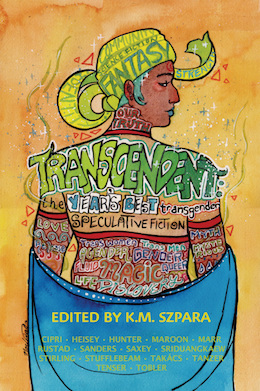For the first time, joining their annual “best of” collections of lesbian and gay sf, Lethe Press will be publishing Transcendent, an annual collection of the best transgender sf: stories centering on trans characters as well as stories that occupy a trans subjectivity. K.M. Szpara is the editor for this first volume, which collects stories from a variety of writers and initial publications—including folks like Nino Cipri, A. Merc Rustad, Benjanun Sriduangkew, and Bogi Takács.
As a critic, there are occasional moments where it’s difficult to sort one’s response to a text out from objective considerations of skill, style, and merit and subjective intense pleasure at the fact that it exists. The metaphor I tend to use is: the book slammed down on all the buttons of things I need and here we are. So, I read this one twice to give it a fairer shake.
First off, I appreciated Szpara’s editorial stance, as outlined in the introduction. While most of the pieces are directly about trans folks, he also notes, “there are stories without transgender characters, but with metaphors and symbolism in their place, genuine expressions of self through shapeshifting and programming. We saw ourselves in those transformative characters, those outsiders, before we saw ourselves as human protagonists.” That, for me, has certainly been the case; I still have an almost overwhelming identification with stories about shapeshifting, for example. I like the remit of this collection including trans stories, characters, and themes, while simultaneously avoiding the trap of making the alien stand in for actual representation.
The first story, Nino Cipri’s “The Shape of My Name,” was one of the stories I first thought of when I considered a year’s best for transgender fiction. It stands up well to a second and third read; Cipri’s story is not necessarily unpredictable, but it doesn’t need to be. Instead, it follows a track the reader expects… but invests that track with a great deal of familial conflict and emotional intensity.
“into the waters I rode down” by Jack Hollis Marr also stuck with me. There is a sense of history and culture wide-ranging beyond the brief frame of the story. That’s a tactic I appreciate, and it made the piece feel both grand and intimate—though in the end it’s rather upsetting and doesn’t offer the reader much hope. However, Marr explores gender, disability, and the trouble of resource war in a brief but incisive way, here. It’s one of the more compelling pieces in the book.
Another quality story was B R Sanders’s “The Scaper’s Muse,” which is very brief—but had some interesting ideas about the modification of bodies as art, humans as only one species in a vast universe, and so forth. Penny Stirling’s “Kin, Painted” also deals with art and bodies; the protagonist is not trans, though family members in the narrative are. The piece has a poetic structure, told in snippets where the protagonist attempts to discover what “paint” suits best—so, in this way, it also strikes a note thematically.
Other stories, like Holly Heisey and E. Catherine Tobler’s, also explore ideas of gender and shapeshifting, both scientific and magical. Some, like the pieces by Benjanun Sriduangkew and Bogi Takács, present varieties in gender and erotic relationships as normative rather than the actual focal point of the story. The balance of stories that are about being transgender with stories that feature transgender characters and themes is solid–it gives the reader a variety of viewpoints and approaches, always a good thing for a year’s best.
Of course, in a collection like this, there are always also stories that don’t quite stand up. The primary issue I had with these, to the last, was a lack of polish. There are a few that don’t have a particularly strong narrative arc, or suffer from unclear prose and underdeveloped characters. I wasn’t as impressed by Margarita Tenser’s “Chosen” (a bit too on the nose and twee, not much plot or sense of movement) or E. Saxey’s “The Librarian’s Dilemma” (also overexplained and the arc is rather obvious from the first).
As for the initial publications of these stories, one thing I’d like to see next time around—and that I think would benefit the strength of prose and diversity of perspective—is more attention to stories published in queer venues that are trans and sfnal instead of primarily stories “in genre.” For collections like this, that are focused on the subject of identity and representation of self, it’s important to approach from more than one direction. Plus, there’s something to be said for introducing an sf-based readership to more trans writers from outside the genre who happen to be writing in similar modes.
On the whole, it’s an interesting first outing for the series. Some stories are strong; some are less so, and seem more to be pieces in the process of evolution for the writer in question. Put together, the tapestry Sparza creates is a bit wobbly in terms of quality but nonetheless remains engaging in terms of ideas and function. I suspect this is in part due to the small pool of stories to choose from—though growing every year!—and I hope that a publication like this existing will encourage more and more fiction that could be included down the line. Make the art you want to see, and so forth.
Lee Mandelo is a writer, critic, and editor whose primary fields of interest are speculative fiction and queer literature, especially when the two coincide. They have two books out, Beyond Binary: Genderqueer and Sexually Fluid Speculative Fiction and We Wuz Pushed: On Joanna Russ and Radical Truth-telling, and in the past have edited for publications like Strange Horizons Magazine. Other work has been featured in magazines such as Stone Telling, Clarkesworld, Apex, and Ideomancer.










